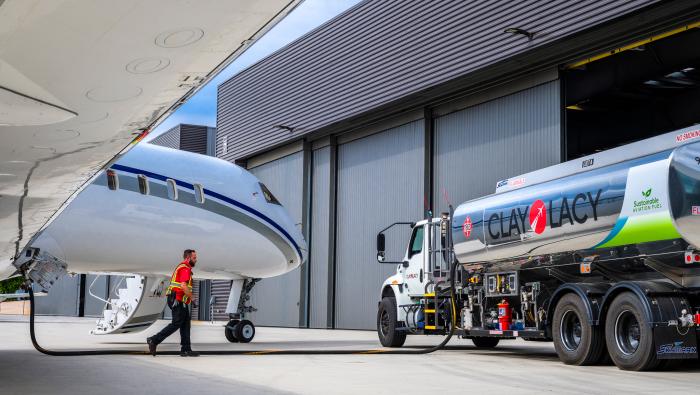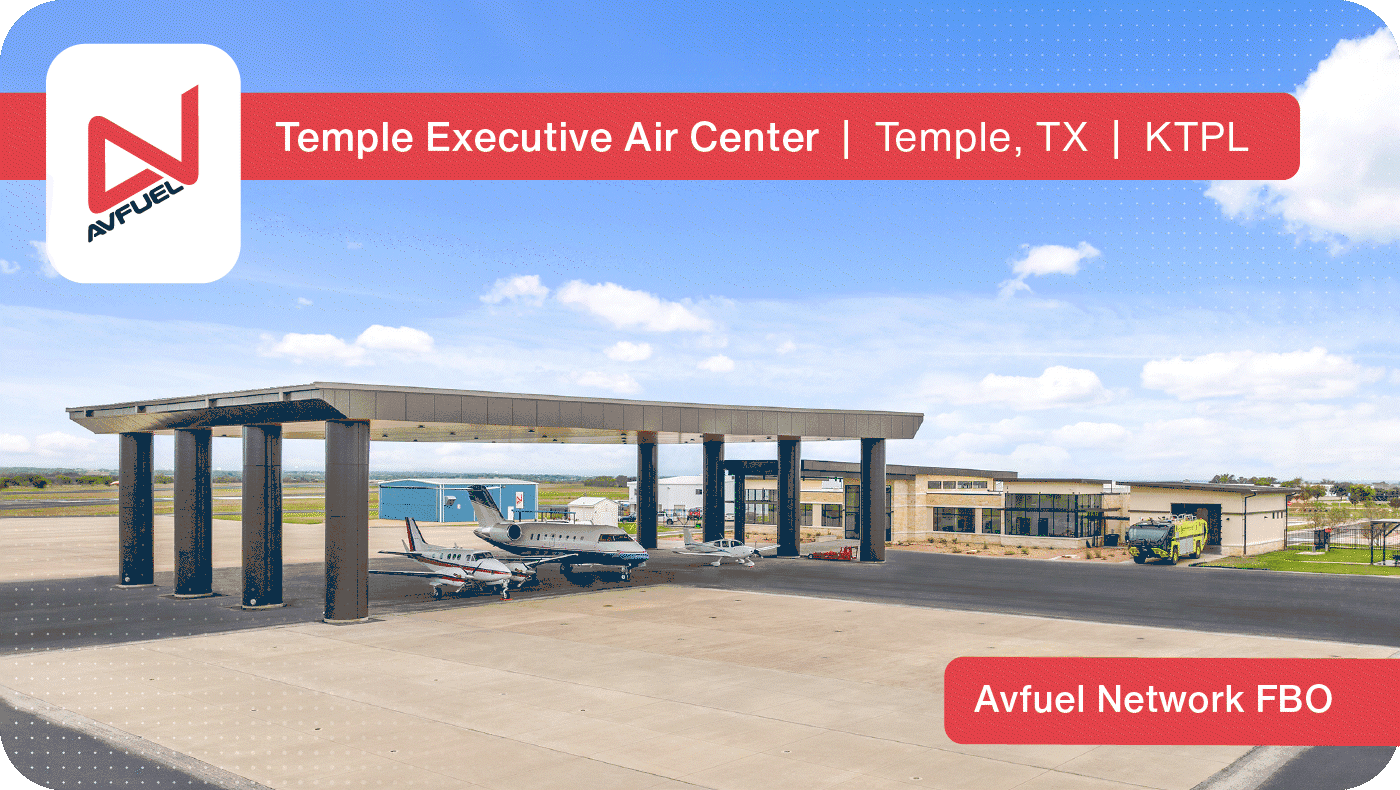|
Clay Lacy Aviation has received accreditation for its infrastructure under NBAA’s Sustainable Flight Department program. It is now one of just eight companies—and the first FBO—worldwide to receive the acknowledgment under the infrastructure category. The program—launched in 2021—identifies business aviation companies that meet exceptional environmental standards under four categories: flight, operations, ground support, and infrastructure. Since 2019, all of Clay Lacy’s facilities have been certified as carbon neutral, with the company using efficient building design, electric ground service equipment, use of renewable diesel, installation of solar panels, the adoption of comprehensive waste management systems, the inclusion of electric vehicle charging stations, and the reduction of single-use plastics. Additionally, the California-based service provider was one of the pioneers in offering continuous supplies of sustainable aviation fuel. “The Sustainable Flight Department Accreditation for infrastructure recognizes the strong commitment Clay Lacy Aviation has made to ensure its facilities and operations are using the most environmentally friendly practices to conduct its business,” said LaKisha Dillingham, the association’s credentialing manager. “We celebrate this outstanding achievement and hope it inspires others to work toward the goal of a more sustainable industry.” |
|
|
In a building called the Glass House next to McConnell Air Force Base in Wichita, Textron’s eAviation division is forging ahead with construction of the first Nexus eVTOL aircraft. The 35-foot-long backbone of the wing—one of the largest composite parts the company has ever made—is mounted to a jig and the fuselage unveiled earlier this year is taking further shape. Textron eAviation is leveraging the skills of experts at its sister companies to build not only the first Nexus but also the infrastructure needed to support the program. This includes Textron Aviation and its McCauley Propeller subsidiary, as well as parent Textron’s Bell and eAviation’s Pipistrel division, along with various internal resources and machinery. For example, the autoclave in which the airframe’s composite parts are cured was originally installed for the Beech Starship airframe and Premier 1/1A and Hawker 4000 composite fuselages. Pipistrel is contributing batteries, battery management systems, and charging technology that will use the CCS1 protocol for the U.S. and CCS2 in Europe. Recently acquired Amazilia Aerospace, renamed Textron eAviation GmbH, is contributing fly-by-wire and ground control station technology. The program is also tapping Bell’s expertise in tiltrotor design and fly-by-wire flight controls. Now Nexus is bringing all these together to create an electric flying machine that could pave the way to an era of sustainable flight. |
|
|
Last week, a New York jury awarded $116 million to the mother of the front-seat passenger who died after a doors-off helitour flight crashed into Manhattan’s East River in 2018. Trevor Cardigan, 26, and four other passengers died after his supplemental harness became entangled with the floor-mounted fuel cutoff control lever on the single-engine 2013 Airbus AS350B2 being operated by Liberty Helicopters on behalf of “shoe selfie” aerial tour firm FlyNYON. The entanglement caused the engine to stop after the fuel lever inadvertently went into the closed position. While the pilot was able to successfully autorotate into the river, the Dart Aerospace skid-mounted pop-out emergency floats failed to fully inflate and the helicopter rolled inverted. The pilot, who was not wearing the supplemental harness, extricated himself; however, the passengers were unable to do so and drowned. At 2019 hearings, then-NTSB Chairman Robert Sumwalt said the use of the construction-grade harnesses turned the flight into a “death trap,” and the accident was otherwise survivable. In making the award, the jury assigned liability at 42% to FlyNYON, 38% to Liberty, and 20% to Dart. Airbus Helicopters was not found at fault. On August 22, the FAA issued rule 89 FR 67834 prohibiting the use of aircraft supplemental restraint systems unless it can be demonstrated that the wearer can rapidly extricate themselves. |
|
|
Minneapolis-St. Paul International Airport (KMSP) received its first shipment of locally produced sustainable aviation fuel (SAF) this week, which will be used to power a Delta Air Lines flight tomorrow as the ceremonial first SAF flight to depart the state. The blended fuel—with its SAF component produced from locally grown winter camelina, a low-carbon-intensity oilseed crop—demonstrated the regional capabilities of biofuel production as championed by the Minnesota SAF Hub. Farmers in Minnesota and North Dakota planted 2,000 acres of winter camelina, a variety developed by the University of Minnesota. After this summer’s harvest, the seed crop was crushed and processed at Cargill’s facility in Fargo, North Dakota, and then moved to the Montana Renewables plant in Great Falls, where it was refined and blended into SAF. The fuel was then sold to Delta Air Lines—which operates a major hub at KMSP—and transported directly to the airport’s fueling facility. “The fact that this first flight is fueled with SAF made from camelina, an innovative regenerative agricultural crop grown in Minnesota, is a breakthrough far beyond what we thought possible just six months ago,” said Peter Frosch, president and CEO of the Greater MSP Partnership. “This first batch of SAF is a demonstration of how we plan to decarbonize air travel and improve water quality on agricultural lands while providing new income sources for farmers in and around Minnesota.” |
|
|
Sponsor Content: Phillips 66 Aviation Discover cutting-edge products, services and innovative fuel solutions designed to streamline and elevate your aviation business |
|
|
An air ambulance company’s “inadequate pilot training and performance tracking” that failed to identify the pilot’s “consistent lack of skill” resulted in his spatial disorientation and loss of control of the turboprop twin while using secondary instruments after the electronic attitude direction indicator failed, according to a recently released NTSB final report. The Dec. 15, 2022 fatal crash of the Beechcraft King Air C90 offshore Kaupo, Hawaii, killed the pilot and two other crewmembers. Contributing to the accident, said the report, “was the lack of a visible horizon during dark night [VMC] overwater conditions and the pilot’s failure to declare an emergency with ATC.” An NTSB review of the pilot’s certification history before he was employed by Guardian Flight (dba Hawaii Life Flight) revealed that, between 2009 and 2019, he had six notices of disapproval entries in his FAA records, each one the culmination of “multiple unsatisfactory training events” detailing “consistent deficiencies” in the use of navigation systems, instruments, and multi-engine aircraft maneuvering. The pilot—who logged 950 of his nearly 7,000 hours in airplanes and had 650 hours in type—was employed by Hawaii Life Flight for three years and had six mandatory checks. He failed three check rides on the first attempt. Training records indicated that following each unsatisfactory training event, the accident pilot was given additional training and subsequently reevaluated as “satisfactory.” |
|
|
The FAA continues to spool up on air traffic controller hiring, exceeding its goal of adding 1,800 this year and reopening the application process shortly for the next year, the agency reported today. In the current fiscal year ending September 30, the FAA has hired 1,811 controllers, the largest number in nearly 10 years as it works to reverse the decades-long staffing decline. More than 3,400 controllers are now in various states of training, from initial instruction at the FAA Academy in Oklahoma to specialized airspace preparation. In all, the agency has more than 14,000 controllers on staff. According to its workforce plan from 2024 through 2033, the agency plans to ramp up hiring to 2,000 in fiscal year (FY) 2025 and a peak of 2,400 in FY 2026. Meanwhile, the controller staff will continue to increase with a goal of nearing 16,200 by FY 2031 as the wave of retirements ease and the agency recovers from Covid-era departures. The next application period begins October 11. Applicants must be U.S. citizens, be able to speak English clearly, be younger than 31, and have a least a year of work and/or education experience. In addition, applicants must pass a medical exam, security investigation, and air traffic pre-employment skills assessment. |
|
|
As a newly authorized Gogo Business Aviation dealer, Global Aviation Tech can install Gogo Avance air-to-ground (ATG) connectivity systems and the upcoming Galileo low-earth-orbit satcom system in customer airplanes. Global Aviation Tech has MRO facilities in Wichita and Elmira, New York, and focuses on special missions modifications and business aircraft MRO services, including avionics upgrades and engineering support. At its Elmira Corning Airport (KELM) facility, Global Aviation Tech is adding a 30,000-sq-ft hangar and office space and a 10,000-sq-ft battery shop. Gogo Galileo, which runs on the Eutelsat OneWeb network, should launch later this year, with up to 60 Mbps download and 11 Mbps upload available with installation of Gogo’s HDX antenna. The larger FDX will be available in the first half of 2025, and service speed will be up to 195 Mbps download and 32 Mbps upload. For aircraft that don’t need worldwide connectivity, Gogo’s Avance systems offer ATG service in the U.S. and much of Canada. Customers that select Gogo’s Avance L5 ATG system with two MB13 phased-array antennas will be able to swap the L5 for Gogo 5G equipment, which will deliver higher-speed service when the 5G service goes live in the second quarter of 2025. “Gogo has set the standard in our industry regarding innovation and providing cost-effective connectivity solutions for clients worldwide,” said Global Aviation Tech president Jerome Cottner. |
|
|
Beta Technologies inaugurated three new electric aircraft chargers at airports across Florida last week. The universal charging stations, which can power various types of electric aircraft and ground vehicles, are now online at Tallahassee International Airport (KTLH) in the Florida Panhandle, Gainesville Regional Airport (KGNV) in north central Florida, and Bob Sikes Airport (KCEW) in Crestview near Eglin Air Force Base. To celebrate the installations, Beta held a commissioning ceremony in partnership with the Million Air FBO at KTLH on Wednesday. “Tallahassee International Airport plays a vital role in driving the local economy, generating an estimated $1 billion annually. As TLH continues to expand its impact, we are excited to join the Florida Department of Transportation, Beta, and Million Air to introduce cutting-edge electric aircraft charging infrastructure at the airport,” said David Pollard, director of aviation for the City of Tallahassee. Following the installation of a Beta charger at Eglin Air Force Base in Florida last year, the Vermont-based company now has four charging facilities in the Sunshine State. Beta is building a nationwide charging network that now includes 32 active sites, and the company has at least another 50 locations in the works. The next Florida location to receive a Beta charging station will be Jacksonville Executive at Craig Airport (KCRG), a company spokesperson told AIN. |
|
|
|
|
|
|
AINalerts News Tips/Feedback: News tips may be sent anonymously, but feedback must include name and contact info (we will withhold name on request). We reserve the right to edit correspondence for length, clarity, and grammar. Send feedback or news tips to AINalerts editor Chad Trautvetter. |
|
AINalerts is a publication of AIN Media Group, 214 Franklin Avenue, Midland Park, New Jersey. Copyright 2024. All rights reserved. Reproduction in whole or in part without permission is strictly prohibited. |
















